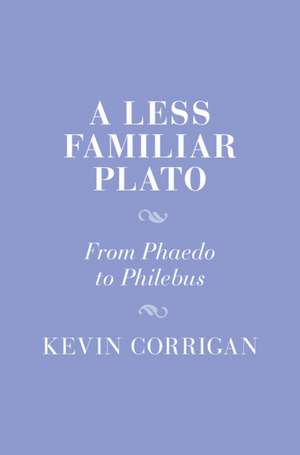A Less Familiar Plato: From Phaedo to Philebus: Cambridge Studies in Religion and Platonism
Autor Kevin Corriganen Limba Engleză Hardback – 30 aug 2023
Preț: 594.27 lei
Preț vechi: 653.05 lei
-9% Nou
Puncte Express: 891
Preț estimativ în valută:
113.73€ • 118.58$ • 94.52£
113.73€ • 118.58$ • 94.52£
Carte tipărită la comandă
Livrare economică 20 martie-03 aprilie
Preluare comenzi: 021 569.72.76
Specificații
ISBN-13: 9781009324854
ISBN-10: 1009324853
Pagini: 350
Dimensiuni: 236 x 157 x 26 mm
Greutate: 0.69 kg
Editura: Cambridge University Press
Colecția Cambridge University Press
Seria Cambridge Studies in Religion and Platonism
Locul publicării:New York, United States
ISBN-10: 1009324853
Pagini: 350
Dimensiuni: 236 x 157 x 26 mm
Greutate: 0.69 kg
Editura: Cambridge University Press
Colecția Cambridge University Press
Seria Cambridge Studies in Religion and Platonism
Locul publicării:New York, United States
Cuprins
I. Embodiment and Participation in the Divine: 1. The Phaedo: embodiment, disembodiment, and the question of 'self'; 2. The place and scope of participation in the divine in Plato and Aristotle; II. Introduction to the Republic and Philebus, Chapters 4-6: 3. The Training of perception: views of Art in the Republic and other works; 4. The non-hypothetical good: art, mind, imagination in the Republic; 5. Is the idea of the good beyond being?; 6. The Philebus-to Stand in the porches of the good and the dwelling of the such; III. Introduction to Love, Myth, Erotikē Technē, and Generative Epistēmē (Chapters 7-9): 7. Love and myth: Symposium, Republic, and Phaedrus; 8. Desire, love, and friendship: a reading of the Lysis, Alcibiades I, Symposium, and Phaedrus; 9. The many questions of Plato's Phaedrus: did Plato write a commentary on his own work? 10. General conclusion; Appendix: scientific perception or sharp seeing in the middle and late dialogues.
Notă biografică
Descriere
Provides new views of perception; embodiment; the Good/Forms; art, imagination, and the divine; interdialogue connections and unwritten teachings

